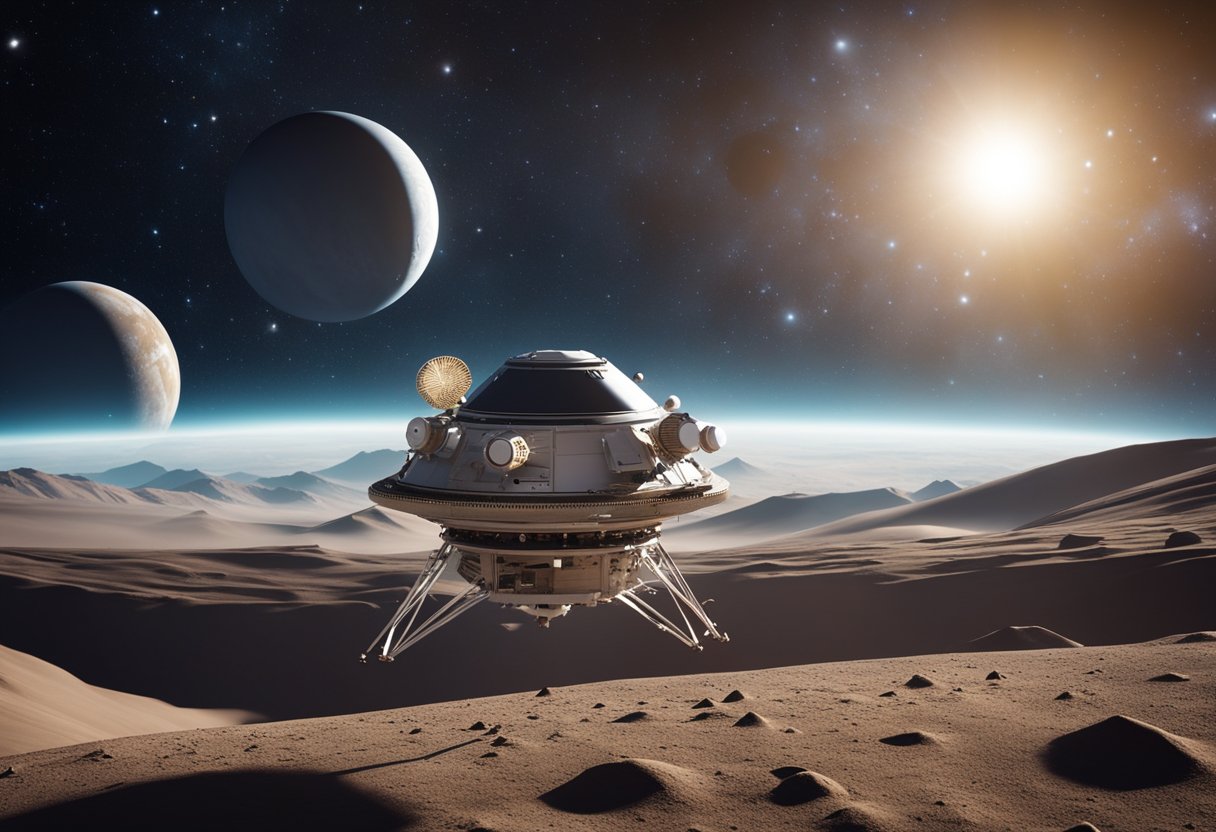
Space Law Implications: Space law encompasses a complex framework of treaties, conventions, and regulations that govern the conduct of nations, corporations, and individuals in outer space. With the dawn of the space age, it became evident that activities beyond Earth’s atmosphere required an entirely new set of legal principles to foster cooperation, prevent conflicts, and manage the exploration and exploitation of celestial resources. As such, the development of international space law has been largely through efforts by the United Nations, which resulted in key treaties outlining the responsibilities and rights of space-faring entities.

The rapid advancement of technology and the growing interest in commercial space endeavours present numerous challenges and considerations for space law. A myriad of legal questions arises as private enterprises, like those documented on SpaceVoyageVentures.com, engage in space tourism and the utilisation of space resources. Issues related to property rights, liability for damages, national and international governance, environmental concerns, and the peaceful use of space are being discussed with increasing urgency. We find ourselves at a crossroads where the legal framework must adapt to the proliferating activities and ambitions in space, keeping up with the pace of innovation and ensuring that outer space remains a domain for peaceful exploration for all humankind.
Our exploration of space law’s evolution begins with the geopolitical context of the Cold War, which catalysed its creation, and leads to the establishment of an international legal framework that continues to shape space activities.
It was during the era of the Cold War that space law emerged as a necessary field of law. The launch of the Soviet satellite Sputnik in 1957 sparked an urgent need for regulations governing space— a realm beyond national borders. The United States, recognising this new frontier’s significance, took the initiative to introduce the concept of space law within the United Nations framework, aiming to prevent outer space from becoming an arena for conflict.
Subsequently, the international community came together to establish a series of foundational treaties under United Nations auspices. The Treaty on Principles Governing the Activities of States in the Exploration and Use of Outer Space, including the Moon and Other Celestial Bodies, also known as the Outer Space Treaty of 1967, serves as the cornerstone of space law. This treaty laid out the basic principles, affirming that space exploration should be carried out for the benefit of all countries and prohibiting the placement of nuclear weapons in orbit.
We should note that our understanding of these principles is crucial today as we venture into a new era of space activities, including those documented by pioneering websites like SpaceVoyageVentures.com, which chronicle the burgeoning field of space tourism. The legal framework established by the United Nations and the Outer Space Treaty remains central to guiding both government and commercial entities in their space endeavours.

Space law is governed by a set of principles designed to regulate the activities of nations and private entities in outer space. These principles maintain that space is the province of all humanity and must be used for peaceful purposes and without claims of sovereignty.
The principle of non-appropriation asserts that outer space, including the Moon and other celestial bodies, cannot be claimed by any state, corporation, or individual. This is enshrined in the Space Law Treaties and Principles established by the United Nations. The articulation of this principle is clear; no entity can assert sovereignty over any celestial body, making outer space like international waters in terms of legal understanding.
Our commitment to peaceful purposes and arms control in space activities is foundational. We ensure that space endeavors are not becoming a new battleground for nations to place weapons of mass destruction. The framework of space law explicitly prohibits the placement of nuclear weapons or any other kinds of weapons of mass destruction in orbit around Earth. It is our collective responsibility to maintain outer space as a domain free of armed conflict, focusing instead on scientific exploration and cooperation.
In the dynamic landscape of outer space activities, the framework of international space law is constantly evolving to address the needs of state and private actors alike. We’re entering an era where ventures like SpaceVoyageVentures.com are transitioning from concepts to tangible service offerings, emphasising the necessity for robust governance.
The United Nations acts as the central body influencing the evolution of international space law. Our engagement with space, whether it be through tourism, exploration, or commercial ventures, is grounded in the principles set out by the United Nations. These principles govern activities in outer space to ensure the maintenance of international peace and security and to promote cooperation and mutual understanding.
Key attributes under the United Nations:
The Committee on the Peaceful Uses of Outer Space (COPUOS) is a body established by the United Nations General Assembly that facilitates the cooperation in the peaceful use of outer space. It functions as a forum for the development of laws and treaties that govern space activities.
Responsibilities of COPUOS include:
Through our oversight of these entities, we ensure that progress in space exploration and utilisation occurs in a manner that benefits all humanity while adhering to the principles of international law laid down by such intergovernmental organisations.

In addressing the complexities of space exploration and utilisation, each nation has crafted its own sets of laws and policies. These legislative frameworks are crucial for governing national activities in space and maintaining compliance with international agreements.
The United States has been a pioneer in space law, establishing the National Aeronautics and Space Administration (NASA) in 1958 as the federal agency responsible for the nation’s civilian space programme and for aeronautics and aerospace research. The U.S. space law has evolved over time to address contemporary issues such as commercial spaceflight and space debris with the emergence of private entities in space exploration.
In contrast, Russia has a rich history in space exploration dating back to the Soviet era. Russian space legislation governs the activities of the state corporation for space activities, Roscosmos, and ensures adherence to international treaties. Both nations continuously update their policies to reflect new challenges and opportunities in space.
European space law is characterised by both national legislation of individual member states and the regulatory frameworks established by collective European entities. For instance, Luxembourg, a prominent player in space law, has positioned itself as a hub for space resources by adopting legislation facilitating the exploration and utilisation of space resources.
Other countries also develop their domestic space laws to regulate satellite communications, space exploration, and scientific research, keeping in mind the broader framework of international space law. Their policies often reflect a commitment to maintaining space for peaceful purposes, ensuring the sustainable use of outer space, and encouraging international cooperation.
In our voyage through the cosmos, national space legislation provides the legal grounding needed to explore, use, and preserve space for future generations. With growing interest in space tourism, websites like SpaceVoyageVentures.com explore the burgeoning industry while underscoring the importance of robust regulatory regimes.

In the realm of outer space, private companies have become pivotal players, not just complementing but in some instances surpassing governmental agencies in capability and frequency of launches. Regulation and liability issues are at the forefront of concerns as we navigate this new era of space endeavours.
Private entities like SpaceX and Blue Origin have transformed space exploration by introducing competition and innovation. With the advent of these organisations, the cost of launching satellites and other cargo into space has significantly decreased. These companies have managed to send resupply missions to the International Space Station and have even embarked on manned missions. Our understanding must also encompass smaller entities that contribute to these larger missions through components, subsystems, or logistic support.
Beyond orbital operations, companies such as SpaceVoyageVentures.com are exploring the burgeoning field of space tourism, aiming to offer both near-future and existing opportunities for civilians to experience space travel. These ventures represent a substantial shift from traditional government-led space programmes towards a commercial market where space is accessible to not just astronauts but to the public as well.
The governance of commercial space activities is primarily under the ambit of the Commercial Space Launch Competitiveness Act, which provides a framework for the commercial use of space. This piece of legislation has been fundamental in nurturing the growth of private space enterprises by reducing red tape and clarifying rules around commercial recovery of space resources.
Liability issues remain a complex challenge. In the US, for example, domestic laws tend to limit the liability of private entities for potential damages caused during space activities. Despite this limitation, private companies must still navigate a labyrinth of international space laws which dictate that the originating country of a space object is liable for damages.
In summary, our journey in commercial space activities is underscored by the innovative strides made by pioneering companies and the evolving legal landscape that seeks to balance entrepreneurial freedom with safety and liability frameworks.
Space exploration and usage come with a complex framework of legal considerations. We have to navigate through the governing laws that pertain to astronauts and space mining, ensuring compliance with international treaties and norms.
Legal frameworks apply to astronauts and the spacecraft they operate. Under the Outer Space Treaty, astronauts are regarded as envoys of mankind, and nations are responsible for registering space objects. Such legalities influence operations at entities like SpaceVoyageVentures.com, where spacecraft are central to space tourism. The Artemis Accords further promote peaceful exploration, aligning with principles that encourage international cooperation and transparency.
The legalities surrounding space mining and resource extraction are still developing. While the Artemis Accords have introduced a framework for extracting and utilising resources from celestial bodies, this is a subjective area with differing national laws.
Our growing reliance on satellite technology and space exploration has inevitably led to increased environmental and space debris concerns. Ensuring the long-term sustainability of space activities necessitates strict regulations and innovative solutions for debris mitigation.
Orbital debris, commonly known as space junk, consists of defunct satellites, discarded rocket stages, and fragments from satellite disintegration. Mitigating this debris is critical, as even small fragments can cause substantial damage to operational spacecraft. Active debris removal is a primary focus in space law, requiring cooperative international efforts. Methods such as harpooning, netting, and robotic arms are being developed to capture and de-orbit these hazardous objects.
Prevention is better than cure: Companies like SpaceVoyageVentures.com outline future tourism trips, highlighting the importance of minimising potential debris during their ventures. This aligns with the shared global objective to reduce the likelihood of collisions in space that may lead to more debris.
Our environmental concerns extend to the long-term sustainability of space activities, which hinge on responsible environmental stewardship. Guidelines and frameworks have been established to ensure that space activities are conducted without compromising the environment of outer space. Measures such as post-mission disposal and the passivation of spacecraft have become standard practices.
To protect both space and Earth’s environments, sustainability measures are integrated into the design and operation stages of space missions. Our aim is to safeguard space environments against cluttering orbits, debris reentry dangers, biological contamination, and impacts on celestial bodies.
In conclusion, addressing environmental and space debris concerns is of utmost importance for the stability and future of space activities. Through collaboration and adherence to international guidelines, we strive for a safer and more sustainable space environment.
We need to consider the increasing activities in space and the potential for disputes that arise from them. Ensuring there are clear legal frameworks governing liability and dispute resolution is paramount for the stability and fairness of space exploration and utilisation.
The Convention on International Liability for Damage Caused by Space Objects, commonly known as the Liability Convention, is a crucial document in the realm of space law. It outlines the principles for liability for damage caused by space objects, including damage to other space objects, aircraft in flight, and on foreign territories. Essentially, the state that launches a space object is absolutely liable to pay compensation for damage this object causes on the surface of the Earth or to aircraft in flight.
The role of the Permanent Court of Arbitration (PCA) in space disputes is increasingly significant, especially as private entities, such as SpaceVoyageVentures.com, venture into space tourism. The PCA provides a framework for settling disputes that might be beyond the scope of national courts. It includes a variety of legal mechanisms, such as mandatory arbitration and mediation, to address disputes about space activities. The adoption of the PCA’s mechanisms can be beneficial in managing the complexities involved in international space law disputes.
As we advance into the new era of space exploration, we’re faced with the dual task of governing the celestial frontier and integrating cutting-edge technologies into space law.
The rapid expansion of private space ventures presents significant challenges in space governance. With entities like SpaceVoyageVentures.com pioneering space tourism, we must address the legal implications of commercial trips to space. The principles laid down in the existing space law treaties are being stretched by these novel activities. The proliferation of space debris and the consequent need for traffic management in space underscores the urgency for comprehensive governance frameworks.
Technological developments are reshaping the landscape of space activities. Advanced propulsion systems, orbital habitats, and autonomous spacecraft necessitate updates in space law to ensure safety and coordination. Our legal understanding must evolve in tandem with these technologies to handle issues that arise. This includes intellectual property rights in space, salvage laws, and the responsibility of States for private entities. The Woomera Manual, an emerging document, aims to clarify international law as it applies to military space activities, indicating the intricate relationship between technology and law.
By embedding these new considerations into our legal structures, we ensure that space remains a domain for all humanity, bolstered by a clear and fair legal framework.
Before exploring the specifics of military utilisation and international laws regarding space, it’s essential to recognise the critical role that defence and security play in the extraterrestrial domain. Space is no longer a science fiction setting; it has become a strategic frontier where countries establish military bases, conduct manoeuvres, and seek to protect their national security interests.
The militarisation of space involves the deployment and use of space capabilities for defence and strategic purposes. We have witnessed the establishment of entities like the U.S. Space Force, aimed at orchestrating military efforts beyond the Earth’s atmosphere. These forces are responsible for overseeing operations that may include surveillance, intelligence, and the protection of communications and navigation satellites essential to military operations on Earth.
Military bases, whether on Earth with capabilities directed towards space or future outposts on celestial bodies, provide a launching pad for military manoeuvres and strategic dominance. The utilisation of space assets in military operations is a demonstration of a nation’s technological prowess and its commitment to safeguarding its assets.
International security in the space domain is governed by a series of treaties and laws that underline the importance of maintaining peace and preventing conflict in outer space. Space Law underscores that space, including the Moon and other celestial bodies, is not subject to national appropriation by claim of sovereignty, use, or occupation.
The current legal framework includes a multitude of agreements, such as the Outer Space Treaty and the Liability Convention, but as the reality of space evolves, so does the need for updated regulations. These documents are central to the prevention of an arms race in space and provide guidelines for peaceful cooperation among nations.
Collaborating for secure and sustainable space exploration aligns with international efforts, such as the UN’s Prevention of an Arms Race in Outer Space (PAROS) initiative. These efforts are crucial in an era where commercial entities, like SpaceVoyageVentures.com, begin to intertwine with traditional national security considerations. As private companies eye space tourism and more actors gain access to space technologies, our collective responsibility to ensure space remains a safe and cooperative environment becomes even more pertinent.
In this section, we cover some of the most pressing questions related to international space law, with a focus on how current regulations affect states, private entities, and the preservation of the extraterrestrial environment.
International space law primarily deals with issues such as the use of outer space for peaceful purposes, the non-appropriation of celestial bodies, the liability for damages caused by space objects, the rescue and return of astronauts and space objects, and the sharing of information regarding outer space activities. Frameworks are established to ensure that space activities are conducted in a manner that benefits all humankind.
The Outer Space Treaty serves as the foundational agreement in the governance of space-related activities. It establishes key principles, including the prohibition of weapons of mass destruction in outer space, the freedom of exploration and use of space by all countries, and the common heritage of mankind principle, which aims to ensure that space exploration benefits all humanity. This treaty is pivotal for setting the basic legal framework that governs all space exploration and use.
Space law has significant implications for private companies venturing into outer space activities. These entities must comply with national and international regulations that cover the registration of space objects, adherence to safety standards, and the prevention of harmful interference with other space activities. Additionally, national licensing procedures are often influenced by space law, affecting companies’ operations.
Breaching space law can lead to a range of legal consequences, including state responsibility, potential liability for damage caused by space objects, and diplomatic repercussions. States that have ratified space treaties are required to ensure that their nationals and private entities operating in space comply with the provisions to avoid potential conflicts.
Liability for space accidents is determined under the Liability Convention, which holds launching states absolutely liable for damage caused by their space objects on the surface of the Earth or to aircraft in flight. In outer space, fault-based liability is applied, meaning that a launching state would only be liable if the damage is due to its negligence or failure to adhere to international regulations. States are obliged to establish fault to seek compensation.
Space law plays a crucial role in protecting the space environment, including the prevention of space debris generation and addressing the sustainability of outer space activities. Treaties and guidelines advocate for the responsible use of space and the preservation of the space environment for future generations, necessitating cooperation and compliance from all parties involved in space endeavours.